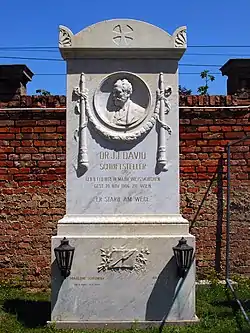Jakob Julius David
Jakob Julius David (6 February 1859 – 20 November 1906) was an Austrian novelist and journalist, born in Hranice.
Life
Jakob Julius David was born the son of a wealthy German-Jewish farmer in Habsburg Moravia. The family soon moved to Fulnek, where the father died. David attended high schools in Kremsier and Opava. Here he fell ill in 1873 severely from typhus, which severely limited his vision and hearing. Nevertheless, he began in 1877 in Vienna with a degree in Germanic and history and took an active interest in student life in the capital.
Since he was denied due to his disability, the teaching profession, he worked as a tutor and then as a journalist. Jakob Julius David worked as an editor and journalist, including for the Wiener Mode, Die Zeit, the Mondaysrevue, the Wiener Allgemeine Zeitung, the Neue Wiener Journal and the Wiener Zeitung. He was also a freelance writer.
In 1889 he obtained his promotion to Doctor of Philosophy. He converted from Judaism to Catholicism, but this had no great significance because he was still in close contact with Jewish personalities and wrote philo-Semetic articles for Jewish publications, such as the Austrian Weekly. In 1891 David married Julie Ostruska, the marriage produced a daughter. In 1899 he made an extended trip to Italy. Jakob Julius David joined the Masonic Lodge Zukunft, writing reviews for its magazine Zirkel. In 1905 he was diagnosed with bronchial cancer and died in 1906 at the age of 47 years in Vienna. He is buried in a memorial grave in the Vienna Central Cemetery (group 0, row 1, number 52).
Artistic creation

His literary output includes poems, films, tales and drama, where his best and most lasting work is undoubtedly the stories. In his early work reflects the influence of Conrad Ferdinand Meyer s. Many of his novels and short stories deal with his Moravian home or are in the middle-class milieu of Vienna. Stylistically, Jakob Julius David is judged very differently, and his works are part of the naturalism associated with it, on the other hand, regarded as the representative of literary decadence. Others assign it to the Austrian realism. Although the author is one part of the lesser known writers in Austria, but his stories were issued in the last 20 years, again and again.
Awards
- Prize from the Sisters Fröhlich Foundation
- 1897: Bauernfield price
- Honorary grave in the Vienna's Central Cemetery by Joseph Kassin with the inscription: He died on the way.
Works
- Collected works in seven volumes. Munich and Leipzig, 1908–1909
Poems
- Poetry. Dresden 1892
Novels
- Blood, Dresden o.J.
- The way to die, Berlin 1900
- The transition, Berlin 1903
Stories
- The law courts. Dresden 1890
- The born again. Narratives. Dresden and Leipzig 1891
- Problems. Narratives. Dresden and Leipzig 1892
- Early appearance. Stories from the output of the Great War. Leipzig 1896
- Four stories. Leipzig and Berlin 1897
- Troika. Narratives. Leipzig and Berlin 1901
- The Hannah. Tales from Moravia. Berlin and Leipzig, 1904
- Hallucinations. in New German Observations XVII 1906
- Miracle saint. Narratives. Vienna 1906
Dramas
- Hagar's son, acting, Vienna 1891
- A rainy day, Drama, Leipzig 1896
- Inclination, acting, Leipzig 1898
- Faithful Eckardt, Drama, Leipzig 1902
Essays
- Mitterwurzer, Berlin 1905
- From work, Essays, Jena 1906
- Essays. Munich 1909
Further reading
- Kurt Vancsa (1957), "David, Jacob Julius", Neue Deutsche Biographie (NDB) (in German), 3, Berlin: Duncker & Humblot, p. 536
- "1 / 171 .pdf David Jacob Julius". In: Österreichisches Biographisches Lexikon 1815–1950 (ÖBL). Vol. 1 , Austrian Academy of Sciences, Vienna 1957, p. 171 .